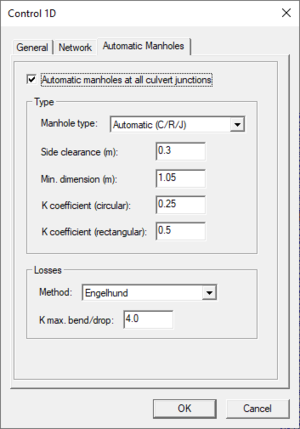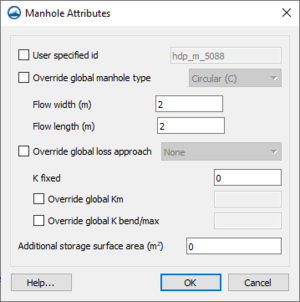SMS:TUFLOW Manholes: Difference between revisions
From XMS Wiki
Jump to navigationJump to search
No edit summary |
|||
| (5 intermediate revisions by the same user not shown) | |||
| Line 2: | Line 2: | ||
==Automatic Manholes== | ==Automatic Manholes== | ||
[[Image:TUFLOW MC 1D Auto. | [[Image:TUFLOW MC 1D Auto.png|thumb|300 px|TUFLOW Model ''Control 1D'' showing the ''Automatic Manhole'' tab]] | ||
Global manhole attributes can be set up for a TUFLOW simulation in the TUFLOW 1D model control. TUFLOW will then automatically create manholes when the following criteria are met: | Global manhole attributes can be set up for a TUFLOW simulation in the TUFLOW 1D model control. TUFLOW will then automatically create manholes when the following criteria are met: | ||
* There is at least one incoming and one outgoing culvert & | * There is at least one incoming and one outgoing culvert—a culvert is a C, I or R channel. | ||
* There are no open channels connected (ie. no bridges, weirs or any other channel that is not a culvert). | * There are no open channels connected (ie. no bridges, weirs or any other channel that is not a culvert). | ||
* Pit channels can be connected, but are not included in any of the calculations for determining manhole energy losses. | * Pit channels can be connected, but are not included in any of the calculations for determining manhole energy losses. | ||
| Line 20: | Line 20: | ||
==Manual Manholes== | ==Manual Manholes== | ||
[[File:TUFLOW ManholeAttributes.png|thumb|300 px|The TUFLOW ''Manhole Attributes'' dialog]] | [[File:TUFLOW ManholeAttributes.png|thumb|300 px|The TUFLOW ''Manhole Attributes'' dialog]] | ||
The global manhole parameters can be overridden by creating manholes in a TUFLOW 1D Network coverage. Toggling on ''Manhole'' and selecting the '''Manhole Attributes...''' button in the [[SMS:TUFLOW Network Node Attributes|1D | The global manhole parameters can be overridden by creating manholes in a TUFLOW 1D Network coverage. Toggling on ''Manhole'' and selecting the '''Manhole Attributes...''' button in the [[SMS:TUFLOW Network Node Attributes|1D network ''Node Attributes'']] dialog allows setting the following parameters for manually created manholes: | ||
* ''ID'' – | * ''User specified ID'' – Sets a name for the manhole | ||
* '' | * ''Override global manhole type'' – Includes options for: "Circular (C)", , "Rectangular (R)", or "No chamber (J)". | ||
* ''Flow Width'' – The flow width in meters. This is the diameter for circular manholes. | |||
* ''Flow Length'' – The flow length in meters. Not used for circular manholes. | |||
* ''Flow Width'' – The flow width in meters | * ''Override global loss approach'' – Loss approach to be used. Options include: "None", "Engelhund", or "Fixed". | ||
* ''Flow Length'' – The flow length in meters | * ''K fixed'' – Set the fixed component of the calculated manhole loss coefficient. | ||
* '' | * ''Override global Km'' – Exit coefficient used by Engelhund approach. | ||
* ''K | * ''Override global K bend/max'' – Upper limit of the combination of K theta and K drop used by Engelhund approach. | ||
* ''Km'' – Exit coefficient used by Engelhund approach | * ''Additional storage surface area'' – Usually set to zero. | ||
* ''K | * ''Invert'' – Bottom or bed elevation of manhole. | ||
If a [[SMS:TUFLOW_Coverages#1D_Network_Coverage|TUFLOW 1D Network coverage]] has manholes defined, the manholes will be written out as their own layer when exporting TUFLOW files. | If a [[SMS:TUFLOW_Coverages#1D_Network_Coverage|TUFLOW 1D Network coverage]] has manholes defined, the manholes will be written out as their own layer when exporting TUFLOW files. | ||
| Line 43: | Line 43: | ||
{{Template:Navbox SMS}} | {{Template:Navbox SMS}} | ||
[[Category:TUFLOW Dialogs]] | [[Category:TUFLOW Dialogs|man]] | ||
[[Category:TUFLOW|M]] | [[Category:TUFLOW|M]] | ||
[[Category:External Links]] | |||
Latest revision as of 16:54, 12 August 2019
TUFLOW in SMS allows for both automatic and manual manhole settings.
Automatic Manholes
Global manhole attributes can be set up for a TUFLOW simulation in the TUFLOW 1D model control. TUFLOW will then automatically create manholes when the following criteria are met:
- There is at least one incoming and one outgoing culvert—a culvert is a C, I or R channel.
- There are no open channels connected (ie. no bridges, weirs or any other channel that is not a culvert).
- Pit channels can be connected, but are not included in any of the calculations for determining manhole energy losses.
The following global attributes are set:
- Automatic Manholes at All Culvert Junctions – Whether or not to have TUFLOW automatically create manholes.
- Manhole Type – Circular, rectangular, junction, or automatically determined.
- Side Clearance – For circular manholes, the default side clearance from the side of the largest culvert to the side of the manhole chamber. For rectangular manholes, the side clearance from the side of the culvert to the side of the manhole chamber.
- Minimum Dimension – Minimum diameter for circular manholes and minimum width and length for rectangular manholes.
- C Exit Coefficient – K coefficient for flow out of circular manholes.
- R Coefficient – K coefficient for flow out of rectangular manholes.
- Loss Approach – Loss approach to be used (none, Engelhund, Fixed).
- K Maximum Bend/Drop – Maximum K energy loss coefficient that can occur for the sum of the loss coefficients for bends and drops at a manhole when using the Engelhund approach.
Manual Manholes
The global manhole parameters can be overridden by creating manholes in a TUFLOW 1D Network coverage. Toggling on Manhole and selecting the Manhole Attributes... button in the 1D network Node Attributes dialog allows setting the following parameters for manually created manholes:
- User specified ID – Sets a name for the manhole
- Override global manhole type – Includes options for: "Circular (C)", , "Rectangular (R)", or "No chamber (J)".
- Flow Width – The flow width in meters. This is the diameter for circular manholes.
- Flow Length – The flow length in meters. Not used for circular manholes.
- Override global loss approach – Loss approach to be used. Options include: "None", "Engelhund", or "Fixed".
- K fixed – Set the fixed component of the calculated manhole loss coefficient.
- Override global Km – Exit coefficient used by Engelhund approach.
- Override global K bend/max – Upper limit of the combination of K theta and K drop used by Engelhund approach.
- Additional storage surface area – Usually set to zero.
- Invert – Bottom or bed elevation of manhole.
If a TUFLOW 1D Network coverage has manholes defined, the manholes will be written out as their own layer when exporting TUFLOW files.
Related Topics
SMS – Surface-water Modeling System | ||
|---|---|---|
| Modules: | 1D Grid • Cartesian Grid • Curvilinear Grid • GIS • Map • Mesh • Particle • Quadtree • Raster • Scatter • UGrid |  |
| General Models: | 3D Structure • FVCOM • Generic • PTM | |
| Coastal Models: | ADCIRC • BOUSS-2D • CGWAVE • CMS-Flow • CMS-Wave • GenCade • STWAVE • WAM | |
| Riverine/Estuarine Models: | AdH • HEC-RAS • HYDRO AS-2D • RMA2 • RMA4 • SRH-2D • TUFLOW • TUFLOW FV | |
| Aquaveo • SMS Tutorials • SMS Workflows | ||

